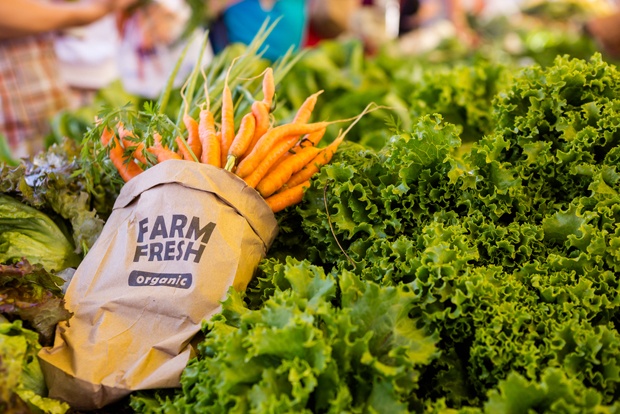
Things are changing at major grocery stores.
Up until recently, you had to make an extra trip to a Whole Foods store (or something similar) to find a good supply of organic, natural, and other healthy food options.
Recent announcements by Target and Wal-mart are likely to change that, giving more people access to foods that are lower in pesticides and other potentially harmful chemicals, as well as greener household products (like air fresheners). This is mostly good news, but I have a few concerns I want to share with you, as well.
What the Giants Said
I talked about the beginnings of these changes last year. Wal-Mart pledged in 2013 to go eco-friendly with household cleaners and to reduce 10 chemicals from cosmetics. Target set a new policy for safety and reduction of chemicals in personal care.
Now, according to news reports, Wal-mart Stores Inc. “is throwing its weight behind organic products, a move that experts say could have the same lasting effect on environmental practices that Wal-mart has had on prices by forcing suppliers and competitors to keep up.” In its most recent move, the retailing giant announced that it will start carrying the Wild Oats brand, an almost-entirely-organic brand previously owned by Whole Foods. The kicker-it will price the products at least 25 percent cheaper than competitors.
The New York Times reported on April 8, 2014, that Target would expand its inventory of “natural, organic, and sustainable” goods to meet growing customer demand. A new category entitled “Made to Matter-Handpicked by Target” will help identify these products to customers.
Benefits for Companies
Of course, for these companies, it’s all about money. Over the past several years, Wal-mart and Target have been losing many of their customers’ dollars to other stores like Whole Foods that offer organic and natural products.
Customers want access to these products, and so far, haven’t found what they needed at the big-name supermarkets. Wal-mart and Target both realized that if they offered more organic, natural, and eco-friendly products in their stores-especially if they do so at a cheaper price (which they plan to do)-they’re likely to woo away customers back from other businesses and increase their own bottom lines. After all, most of us prefer one-stop shopping for speed and convenience.
Benefits for Consumers
Wal-mart actually launched its new “greener” policy last year, and we’re starting to see the results. One of the major benefits of this move is that these products will lose some of their “premium” status.
The idea that eating healthy is expensive business has prevailed for years, with critics railing that poor people deserve access to healthy food, but because of the price tag, have been unable to afford it. And there’s some truth to that idea. Because organic raw ingredients are produced on a smaller scale, they tend to be more rare, driving up demand, and consequently, price.
Wal-mart’s move to offer these products for less is likely to remove some of the sheen around organic products, making them more available to people of all incomes. It’s also likely to increase supply of organic raw materials as well, which should eventually bring all prices down.
Familiar Brands Going “Target”
As for Target, it’s introducing more than 120 new products over the next several months, working with brands like Kashi and Burt’s Bees to deliver items that are exclusive to its stores-diapers without bleach, for example, or air fresheners without aerosol. (Though I still recommend you steer clear of most store-bought air fresheners!) Target has sold some organic products all along, but this move signals their desire to expand what they offer, to further entice conscientious consumers.
Both of these large retailers bring significant financial might to back up sustainable and organic products, which will only grow the organic industry, making products more available and affordable for more people.
Words of Caution
Amidst all this good news I want to caution you, however, about the following things:
- Don’t assume it’s organic. Just because a product is listed in Target’s new collection doesn’t mean it will be organic, as not all of them are. (Some are just “natural,” which can have a broad meaning, for example.) Wal-mart, as well, may carry more organic packaged goods, but not necessarily more organic raw produce. Keep an eye out for the USDA organic seal. Produce that is organic has a 5-number label with a “9” first.
- Don’t assume it’s safe. The front of the product may also look very “natural” with green colors and messages about natural ingredients. But always turn the box or bottle around and read the ingredient list.
- Don’t assume it’s from the U.S. Though you’d think that products labeled with the USDA organic seal would be from the U.S., that’s not always true. A number of other countries grow organic products that are certified to the USDA organic standards. You can usually find the source of a company’s raw materials by doing some digging (call the company or check out their website), but with both Wal-mart and Target will be putting their own brands on their organic products, and may not be able to resist cheaper organic raw materials from China. There have been other safety concerns with Chinese products, so something to be aware of.
We’re going to keep an eye on these big retailers as they role out these changes. We don’t want them pressuring the organic industry to make changes that would be good for profits but bad for our health, for instance.
But as long as you watch out for these things, you can feel free to celebrate this good news. Little by little, we are all working together to make healthier food, personal care, and home care products available to all.
What do you think of this announcement? Will it change your shopping habits?

